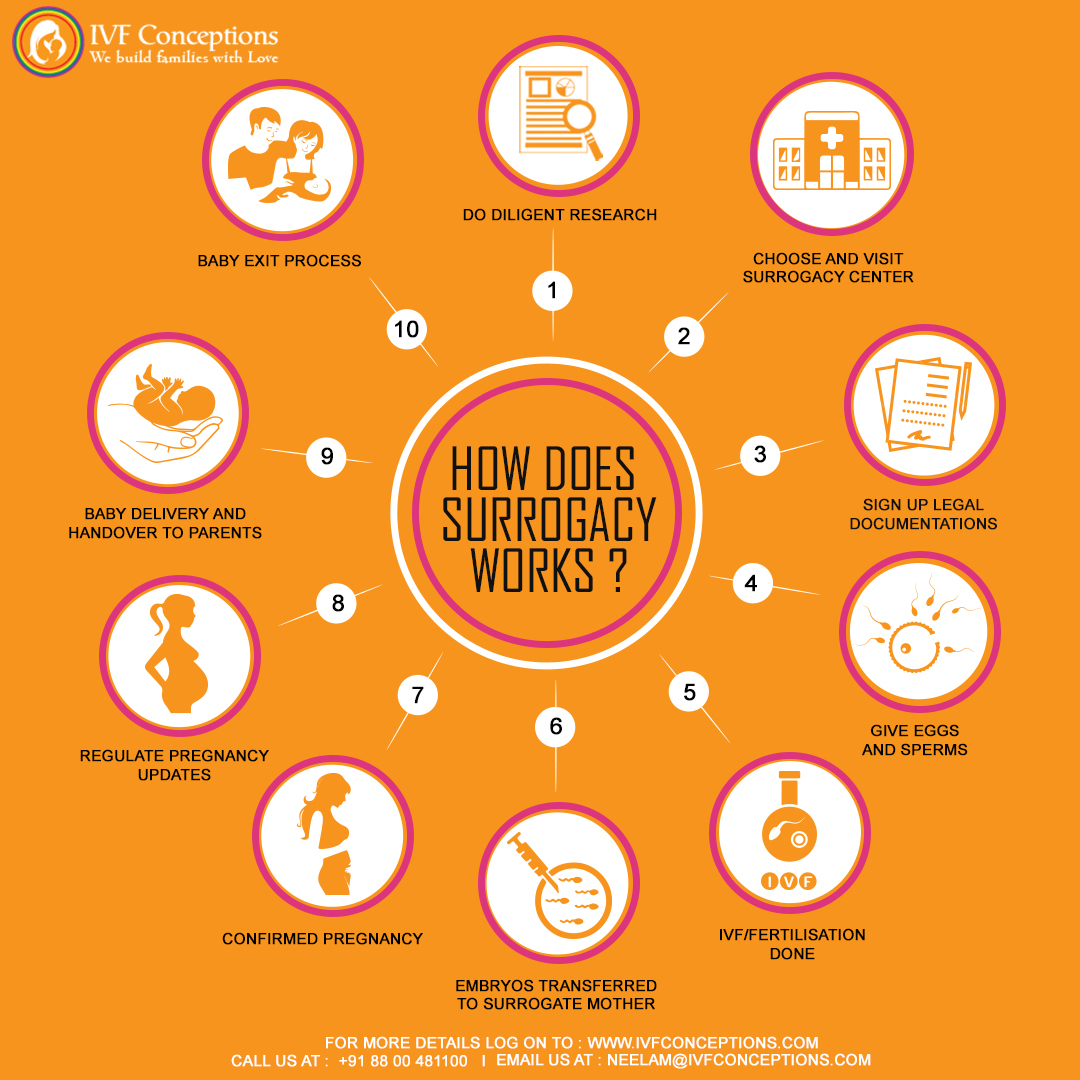Surrogacy vs Adoption: A Comparison Guide for Building Your Family

The main difference between surrogacy and adoption is that in surrogacy baby is genetically related to one or both parents and in adoption, the baby is not genetically connected at all. Building a family is a deeply personal journey, and for those facing challenges with conceiving or expanding their family, surrogacy, and adoption offer alternative paths to parenthood. In this article, we will cover the pros and cons of surrogacy Vs adoption which might help you make the best decision for you.
For those who are unable to conceive naturally, surrogacy and adoption offer two options to achieve the dream of parenthood. But how exactly do these paths differ?
In this comprehensive guide, we’ll examine the key contrasts between surrogacy and adoption. We’ll compare the medical, legal, financial, and emotional factors to consider with each.
Understanding the pros, cons, timelines, and costs can help intended parents determine which route may be right for them. While every journey is unique, education and insight into both processes allow for an informed decision.
There is no one “better” option—just the choice that aligns best with each individual or couple’s specific needs and desires for growing their family.
We will cover the difference between surrogacy and adoption, highlighting the key aspects, benefits, and potential challenges of each option. By gaining insights into surrogacy and adoption, you can make an informed decision that aligns with your desires and circumstances.
Both gestational surrogacy and adoption are great ways to complete a family. Both processes seem to be alike- but each has its pros and cons. It is up to the intended parents to decide what is best for them.
 Understanding Surrogacy:
Understanding Surrogacy:
What is surrogacy?
Surrogacy is a process in which a woman carries a pregnancy and delivers a child on behalf of another person or couple. It is often chosen by individuals or couples who are unable to carry a child themselves due to medical reasons or same-sex couples who desire a biological connection to their child.
Types of surrogacy arrangements:
- Traditional Surrogacy: In this arrangement, the surrogate mother is also the biological mother of the child. The surrogate’s egg is fertilized, typically through artificial insemination.
- Gestational Surrogacy: In gestational surrogacy, the surrogate mother carries a child conceived using the intended parents’ egg and sperm or donated gametes. The surrogate has no genetic connection to the child.

The surrogacy process takes 18 months to 24 months depending upon the individual circumstances
Outlines the surrogacy process timeline for gay intended parents:
|
Stage |
Description of Stage |
Duration |
|
Research Phase |
Explore family-building options and decide on surrogacy. |
Personal timeframe |
|
Consultation and Application |
Choose a surrogacy agency, sign an agreement, and start embryo creation (if needed). |
1-3 Months |
|
Matching |
The agency finds and presents potential gestational carriers. Meet and decide on a match. |
3-6 Months |
|
Medical Screening and Contracts |
Carrier undergoes medical and psychological screening. Sign a surrogacy contract. |
1-2 Months |
|
Embryo Transfer |
Prepare for embryo transfer. Success may take multiple attempts. |
1-1.5 Months |
|
Pregnancy |
Gestational carrier’s pregnancy, approximately 40 weeks. |
9-10 Months |
|
Birth and Postpartum |
Baby’s birth established parental rights and the postpartum period. |
1.5-3 Months |
Please keep in mind that the durations mentioned in the table are approximate and can vary depending on individual circumstances and other factors. Always consult with a reputable surrogacy agency or professional to get personalized guidance throughout the surrogacy journey.
Pros and cons of surrogacy:
Pros:
– Biological connection to the child is possible.
– Greater control over the prenatal environment and healthcare.
– Opportunity for intended parents to be involved throughout the pregnancy.
Cons:
– High financial costs associated with surrogacy.
– Legal complexities and variations across jurisdictions.
– Emotional challenges for all parties involved.
Exploring Adoption:
What is adoption?
Adoption is the legal process through which individuals or couples become the legal parents of a child who is not biologically related to them. It provides a means to build a family and offer a loving home to a child in need.
Types of adoption:
- Domestic Adoption: This involves adopting a child from within the same country. The process and requirements vary depending on the laws and regulations of the specific country or state.
- International Adoption: International adoption involves adopting a child from another country. It requires navigating the legal processes of both the home country and the adopted child’s country of origin.
 Pros and cons of adoption:
Pros and cons of adoption:
Pros:
– Providing a loving and stable home to a child in need.
– Availability of support services and resources for adoptive families.
– Potential for a transformative experience and personal growth.
Cons:
– Lengthy adoption processes and waiting periods.
– Financial costs associated with adoption, including legal fees and home studies.
– Potential emotional complexities, including attachment issues or unresolved trauma.
Related surrogacy Costs guides:
What is the average surrogacy cost?
How much does surrogacy cost in Ukraine?
How much does surrogacy cost in Georgia?
How much does surrogacy cost in India?
What is the Surrogacy Cost in Colombia?
What is Surrogacy cost in Mexico?
What is surrogacy cost with family members?
Surrogacy Vs Adoption Pros and Cons: Compared
#1. Biological Connection
In the case of gestational surrogacy, the embryo is made with the parent gametes and then transferred to the surrogate mother. Hence, it will help the intended parents maintain their biological relationship with the child.
However, in the case of adoption, there is no biological relationship between the child with the parents. In the case of adoption, the child is not biologically related to the parents. By far, this is one of the most critical advantages of the surrogacy process over adoption.
#2. Cost Factor
The cost of the surrogacy and adoption procedure vary drastically.
Creating embryos with a medical procedure like IVF and all surrogacy-related costs make gestational surrogacy much costlier as compared to adoption. Many services like medical process, surrogate compensation, surrogacy agency fee, and legal fees make surrogacy an expensive enterprise.
Adoption might take a long time, but cost-wise, it is a much better option.
Here is a table of the cheapest countries for surrogacy:
|
Country |
Regulation & Organization |
Who is allowed to participate |
Surrogacy Cost |
Legal Assurance |
|
Colombia |
Altruistic |
Singles, gay couples, hetero couples |
Affordable $70,000 |
Reliable |
|
Mexico |
Altruistic |
Singles, gay couples, hetero couples |
Affordable $70,000 to $80,000 |
Reliable |
|
USA |
Commercial |
Singles, gay couples, hetero couples |
Costly $150,000+ |
Strong |
|
Ukraine |
Commercial |
Hetero couples |
Affordable $60,000 |
Strong |
|
Georgia |
Commercial |
Hetero couples |
Affordable $60,000 |
Strong
|
|
Greece |
Altruistic |
Hetero couples and single women |
Affordable $80,000 |
Strong |
#3. Involvement and Time Given
Your control and involvement in both processes vary. In adoption, the parents have less or either no control over the adoption procedure.
In surrogacy, there is greater control of the parents over the procedure as well as the surrogate mother. They can choose the egg donor and surrogate mother. They can make sure they wish to transfer female or male gender embryos etc.
In adoption, parents can have a specific requirement for adoption, but ultimately, it depends on many factors if they get what they want. In the surrogacy process, you can opt for what you want and when you want.
#4. The difference in medical and legal processes
Gestational surrogacy is a complex process that requires a series of medical procedures which is outlined in the legal contract. The intended parents can choose their reproductive attorney to draft the surrogacy agreement and protect the rights of the baby and the intended parents. commissioning parents can also put forth terms and conditions as per their specific requirements in the legal surrogacy contract.
However, the social and legal procedures in the case of adoption may be more overwhelming as compared to the surrogacy journey.
#5. Success rate
Gestational surrogacy, as already mentioned earlier, has a high chance of success. The child belongs to the parents right from the beginning.
While in adoption, when you are adopting a born child, the case may be entirely different. The process of adoption is long and might take many years. There is a possibility that parents might be refused adoption due to some conditions. But in the case of surrogacy, if you have financial backup and desire, you can surely get a baby of your own sooner or later.
On ethical and moral grounds, many people believe that adoption is better. Here, you are not creating a new life, but helping to give a good life to someone who needs it. The intentions are good, but ultimately, it is up to the intended parents what they prefer.
In our opinion, most unconventional parenthood methods are good as per the specific needs and circumstances of the intended parents.

Is adoption cheaper than surrogacy?
Yes, adoption is always cheaper than surrogacy. In the gestational surrogacy process, a medical procedure like IVF is done and it is costly. Besides that, surrogate mother compensation, antenatal care, and legal fees are an integral part of surrogacy. The intended parents can skip the surrogacy agency fee if they are tight on budget by choosing Independent surrogacy.
More resources on surrogacy vs adoption cost:
12 Tips to reduce surrogacy costs for the intended parents.
What are the cheapest surrogacy countries in the world?
Top 4 Cheapest Countries For Surrogacy That Parents Should Know (in 2024)
Countries Where Surrogacy Is Legal (International Surrogacy 2024)
What is the difference between adoption and surrogacy?
In adoption, the parent adopts a child and they do not have a genetic link with the child. Here, a baby/child is already there and the parent adopts the child after a thorough legal and administrative process.
Whereas, surrogacy is a medical procedure of the Assisted Reproduction Technique (ART) that is carried out to create embryos from the commissioning parent gametes ( or donors), and then a third person (known as a surrogate mother) carries and delivers the baby for the intended parents. In surrogacy, the baby is genetically linked with either one or both parents.
Key Considerations Before Choosing Surrogacy or Adoption:
#1. Emotional aspects:
Both adoption and surrogacy can be emotionally challenging journeys. It’s crucial to consider the potential emotional impact on all parties involved, including the intended parents, the surrogate mother (in the case of surrogacy), and the child being adopted.
#2. Legal considerations:
Understanding the legal framework surrounding surrogacy vs adoption is essential. Laws pertaining to surrogacy and adoption vary significantly across countries and even within different states or regions. Familiarize yourself with the legal requirements, rights, and responsibilities associated with each option.
#3. Financial implications:
Both surrogacy and adoption involve substantial financial commitments. Consider the costs of medical procedures, legal fees, agency fees, counseling, and any additional expenses related to the process. Determine what is financially feasible for your individual circumstances. The cost of surrogacy vs adoption varies drastically and it is good to consult an experienced surrogacy professional like IVF Conceptions, with more than 13 years of experience in this domain.
#4. Timeframes and waiting periods:
Surrogacy and adoption processes often involve waiting periods, which can vary greatly. Research the typical timelines associated with each option and assess your readiness to embark on a potentially lengthy journey.
 Surrogacy vs Adoption: Why Surrogacy is Good?
Surrogacy vs Adoption: Why Surrogacy is Good?
- Here are a few benefits of surrogacy –
- Help to start your own family – In the case of surrogacy, the childless couple has the option to start a family with a biological relationship with the child.
- The child is legally yours – In surrogacy, the baby is legally belonging to the parents right from the start. This is the most important benefit of opting for surrogacy.
- Perfect for controlling parents – In the surrogacy process, parents have greater control over your surrogate. They can control her habits, her medical appointments, and many other things.
- The Odds are good – Around 98% of the couples pursuing gestational surrogacy have a baby in the first 3 IVF attempts. These figures ensure the success rate, which is quite astounding. So, the chances of having a baby/babies are bright with surrogacy. This might be owing to good medical advancement and a higher success rate of the IVF process.
- Peace of Mind – In surrogacy, the mind of the intended parents is at peace. They have a secured legal contract that ensures that on the success of surrogacy, the baby is handed over to them. But saying this, the intended parents should know that gestational surrogacy either done domestically or internationally, is a long, emotional, and exhaustive process.
The commissioning parents’ rights are well protected if they choose a surrogacy country that has explicit surrogacy legislation like the USA, Georgia, Ukraine, Colombia, and Mexico.
Read more:
Affordable surrogacy cost in Georiga
Affordable yet secure surrogacy cost in Ukraine

Conclusion
Choosing between surrogacy and adoption is a deeply personal decision that depends on various factors, including your preferences, circumstances, and values. By exploring the differences, benefits, and challenges of each option, you can make an informed choice that brings you closer to realizing your dream of building a family. Remember to seek support, gather knowledge, and trust your instincts as you embark on this life-changing journey.
While talking about surrogacy vs. adoption pros and cons, you need to think about the below factors.
#1. Assessing personal preferences:
Consider your personal preferences and desires when deciding between surrogacy and adoption. Reflect on the importance of a biological connection, involvement in the pregnancy, or the desire to provide a loving home to a child in need. Adoption vs surrogacy for gay couples need to have some more consideration than hetero couples in term of the country where they wish to do surrogacy and the surrogacy agency they wish to work with.
#2. Evaluating individual circumstances:
Evaluate your individual circumstances, including medical considerations, financial stability, emotional readiness, and support systems. These factors can play a crucial role in determining the best option for you.
#3. Seeking professional guidance:
Consulting with professionals specializing in surrogacy or adoption can provide valuable insights and guidance tailored to your specific situation. Reach out to fertility clinics, adoption agencies, or legal experts to gain expert advice on your options.
Contact an experienced and trusted surrogacy professional or adoption agency to have a deeper understanding and choose what works best for you.
Read more for adoption vs surrogate:
Surrogacy pros and cons for intended parents
Surrogacy pros and cons for surrogate mothers
If you’d like to learn more about IVF, Egg Donation, or surrogacy services globally, check out the rest of our website at IVF Conceptions. We offer legally secure and affordable surrogacy consulting services FREE of cost.
Surrogacy vs Adoption: FAQs

Which is better surrogacy or adoption?
When considering whether surrogacy or adoption is better, it’s important to recognize that both options have their own unique advantages and challenges. The decision ultimately depends on the specific circumstances, preferences, and needs of the individuals or couples involved.
The downside of the surrogacy process is that it is extremely costly. Even if you do surrogacy in international countries, the average cost of surrogacy is $70,000. Furthermore, the legal framework for surrogacy is not friendly in all countries. The surrogacy journey is a long emotionally and financially demanding process.
Intended parents choose surrogacy due to their biological link with the baby. Besides this, they have higher chances of having a baby due to advanced medical technologies in the field of assisted reproduction.
The main difference between surrogacy and adoption is that in surrogacy baby is genetically related to one or both parents and in adoption baby is not genetically connected.
Resources Used:

 Understanding Surrogacy:
Understanding Surrogacy:  Pros and cons of adoption:
Pros and cons of adoption: Surrogacy vs Adoption: Why Surrogacy is Good?
Surrogacy vs Adoption: Why Surrogacy is Good?